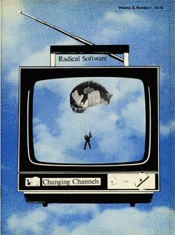"Power is no longer measured in land, labor, or capital, but by access to information and the means to disseminate it. As long as the most powerful tools (not weapons) are in the hands of those who would hoard them, no alternative cultural vision can succeed." So ends the first issue of the historic magazine Radical Software, which is available as a free resource online. Begun in 1970 by alternative media think tank the Raindance Collective along with video artists Beryl Korot, Phylis Gershuny and Ira Schneider, Radical Software focused on video's potential as a tool for grassroots mobilization. Its four-year run included theoretical writings by many luminaries in the field of experimental art practice, such as Buckminster Fuller, Nam June Paik, Ira Schneider, Jud Yalkut, and Gene Youngblood. In addition, Radical Software also provided practical information such as product reviews, tips for shooting and editing, and even instructions on how to build a guerilla television station in the back of your VW bus. The aim of Radical Software was to provide a broad population access to the revolutionary power of video, and although it may appear slightly dated, Radical Software is a remarkable document. It captures the zeal and passion of the early video practitioners in their endeavor to wrestle the television airwaves from the grips of corporate control - a revolutionary message that resounds loudly in the rhetoric of the early Web, and one that warrants revisiting in the face of growing corporate control over Internet bandwidth and content. As David Ross concludes in his impassioned introduction to the online collection, "as we continue to explore the distinctive qualities and capacities of today's technology and the radical hardware it spawns, we recognize that the consideration of Radical Software is more important than ever." Although obviously not made for the web, the seminal journal was archived online in 2002 through the cooperation of Harvestworks and the Daniel Langlois Foundation for Art, Science and Technology, providing a level of access and dissemination only previously dreamed of by its original creators. - Caitlin Jones
